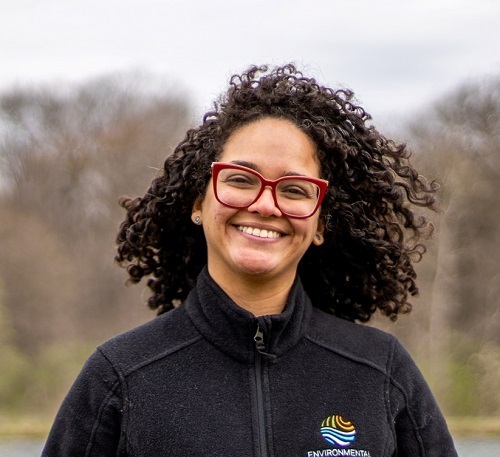Daniele Miranda Assistant Research Professor

Research Interests:
Dr. Daniele Miranda works as an Assistant Research Professor in the Department of Biological Sciences. For more than a decade, Dr. Miranda has been investigating the environmental processes that spread man-made substances in the environment. Over the past six years, Dr. Miranda has focused on studying Per- and Polyfluoroalkyl compounds (PFAS), which are also known as forever chemicals, in aquatic systems. PFAS compose a group of thousands of fluorinated chemicals that are a growing concern for environmental and human health both in the United States and globally. These chemicals can be found in numerous manufactured products, such as airplane surfaces and non-stick frying pans, with the aim of reducing the risk of fires or repelling oil from food packaging, respectively. Although PFAS are found in many everyday items, studies have shown that several compounds of this group are persistent in the environment, toxic, and can accumulate in living organisms. Exposure to PFAS can lead to health problems in humans including cancer, as well as morphological abnormalities and behavior alterations in fish.
Dr. Miranda has a Ph.D. in Ecology with research lines in ecotoxicology and biomonitoring. She received her degree from the Universidade Federal da Bahia in Brazil in 2021. During her studies, she interned at Stockholm University in Sweden, where she conducted research on the degradation, dispersion, and biomagnification of per- and polyfluoroalkyl substances (PFAS) in tropical environments. Dr. Miranda has been working on multiple projects with Dr. Gary Lamberti at the SWEL lab, with a focus on the bioaccumulation and biomagnification of PFAS in fish from the Great Lakes region.
Biography:
- Assistant Research Professor, Department of Biological Science, University of Notre Dame IN. 03/2023-Current
- Postdoctoral Fellow, Departments of Biological Sciences and Physics and Astronomy., University of Notre Dame, Notre Dame, IN, United States. 2021-2023
- Ph.D. Student Researcher, Division of Ecology (sub-area: Ecotoxicology and Biomonitoring), Federal University of Bahia, Salvador, BA, Brazil. 2017-2021
- Guest Ph.D. Student, Department of Analytical Chemistry and Environmental Sciences, Stockholm University, Stockholm, Sweden. 2018-2019
- Master Student, Researcher Division of Oceanography (sub-area: Chemical Oceanography), Federal University of Pernambuco, Recife, PE, Brazil. 2013-2015
Education:
- Post-doctoral, University of Notre Dame South Bend, IN. 2021-2023
- Ph.D., Federal University of Bahia Bahia, Brazil. 2021
- M.Sc., Federal University of Pernambuco Pernambuco, Brazil. 2015
- B.S., Catholic University of Salvador (Bahia, Brazil)
Recent Papers:
- Miranda, D.A., Zachritz, A.M., Whitehead, H.D., Cressman, S.R., Peaslee, G.F., Lamberti, G.A., 2023. Occurrence and biomagnification of perfluoroalkyl substances (PFAS) in Lake Michigan fishes. Sci. Total Environ. 895, 164903. doi.org/10.1016/j.scitotenv.2023.164903
- Leonel, J.; Nascimento, R.; Miranda, D. 2023. Perfluorinated compounds: a threat to the clean ocean. Quimica nova, v. xy, p. 1-9. doi.org/10.21577/0100-4042.20230049
- Miranda, D. A., Peaslee, G. F., Zachritz, A. M., Lamberti, G. A. 2022. “A worldwide evaluation of trophic magnification of per- and polyfluoroalkyl substances in aquatic ecosystems”. Integr. Environ. Assess. Manag. 18:1500–1512. doi: 10.1002/ieam.4579
- Miranda, D. A.; Leonel, J.; Benskin, J.P.; Johansson, J.; Hatje, V., 2021. “Perfluoroalkyl Substances in the Western Tropical Atlantic Ocean”. Environ. Sci. Technol. 55, 13749–13758. doi.org/10.1021/acs.est.1c01794
- Miranda, D. A.; Benskin, J. P.; Awad, R; L, G.; Leonel, J.; Hatje, V., 2021. “Bioaccumulation of Per- and polyfluoroalkyl substances (PFASs) in a tropical estuarine food web”. Science of the Total Environment. 754, 142146. doi.org/10.1016/j.scitotenv.2020.142146.
- Santos, L. L.; Miranda, D. A.; Hatje, V.; Albergaria-Barbosa, A. C.R.; Jeonel, J. 2020. “PCBs occurrence in marine bivalves and fish from Todos os Santos Bay, Bahia, Brazil”. Marine Pollution Bulletin, v. 154, p. 111070, 2020. doi.org/10.1016/j.marpolbul.2020.111070.
- Egres, A. G.; Hatje, V.; Miranda, D. A.; Gallucci, F.; Barros, F. 2019. “Functional response of tropical estuarine benthic assemblages to perturbation by Polycyclic Aromatic Hydrocarbons”. Ecological Indicators, v. 96, p. 229-240, doi.org/10.1016/j.ecolind.2018.08.062
- Yogui, G. T.; Taniguchi, S.; Silva, J.; Miranda, D. A.; Montone, R. C. 2018. “The legacy of man-made organic compounds in surface sediments of Pina Sound and Suape Estuary, northeastern Brazil”. Brazilian Journal of Oceanography (Online), v. 66, p. 58-72, doi.org/10.1590/S1679-87592018148206601. (Invited contribution)
- Miranda, D. A.; Yogui, G. T.; 2016. “Polychlorinated biphenyls and chlorinated pesticides in king mackerel caught off the coast of Pernambuco, northeastern Brazil: Occurrence, contaminant profile, biological parameters and human intake”. Science of the Total Environment, v. 569-570, p. 1510-1516, doi.org/10.1016/j.scitotenv.2016.06.241
- Carvalho-Souza, G. F.; Miranda, D. A.; Pataro, L. 2016. “Hazards in hanging gardens: A report on failures of recognition by green turtles and their conservation implications”. Marine Pollution Bulletin., v. 105, p. 98-101, doi.org/10.1016/j.marpolbul.2016.02.050
- Miranda, D. A.; de Carvalho-Souza, G. F. “Are we eating plastic-ingesting fish?” 2016. Marine Pollution Bulletin., v. 103, p. 109-114, doi.org/10.1016/j.marpolbul.2015.12.035